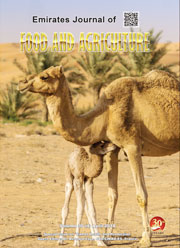MICROBIAL CONTAMINANTS OF DATE PALM (PHOENIX DACTYLIFERA L.) IN IRAQI TISSUE CULTURE LABORATORIES
DOI:
https://doi.org/10.9755/ejfa.v25i11.15351Keywords:
Date palm, In vitro, Microbial contamination, Tissue cultureAbstract
The date palm is one of the most important economic species of the palm family, grown mainly for its fruits (dates). Nowadays there is increased demand for date palm fruits around the world. To meet this demand, several propagation methods have been utilized, among them micropropagation which has been used in Iraq and many other countries for large-scale multiplication of date palm. Micropropagation faces several constraints; one is microbial contamination which represents a major challenge to the initiation and maintenance of date palm micropropagation laboratories. In recent years, two major groups of contaminants have been identified and isolated from different date palm tissue culture laboratories in Iraq. The first group is fungi. Several fungal species have been isolated and identified as contaminants; most predominant are: Aspergillus niger, Alternaria alternata and Penicillium spp. The second group is bacteria; predominantly of the genera Bacillus, Staphylococcus and Proteus.










 .
. 